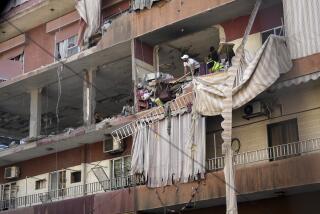ANALYSIS : Buildup Will Force Some War-or-Peace Decisions
AMMAN, Jordan — Iraqi President Saddam Hussein and President Bush, caught in a tightening vise of confrontation, face war-or-peace choices as the American military buildup mounts in the coming months.
Both have stuck doggedly to their tough positions over the nearly 3 1/2 months since the Iraqi invasion of Kuwait, with Bush building a political and military wall around Iraq and Hussein holding onto the oil sheikdom like a bulldog.
With the American deployment of up to 240,000 more troops to the Persian Gulf expected to tip the military balance firmly in favor of the United States within two months, talk of a diplomatic solution is on the rise. But it is a course full of pitfalls for both sides--with no assurance of success.
If a deal is to be struck, probably under the cover of intra-Arab negotiations that have yet to get off the ground, the formula will be delicate and neither side will get what it set out for.
For Iraq, Hussein faces an implied timetable for withdrawing his troops from Kuwait or risking U.S. attack. His previous open-ended strategy of delay-and-discuss may be obsolete.
Indeed, Milton Viorst, an author who has written extensively about Iraq and the Middle East, said the most likely resolution of the conflict would spring from recognition by Hussein that he is outgunned.
“He is not going to win anything until Bush makes the decision that this has got to be a diplomatically resolved problem,” Viorst said in an interview in Washington. “(But) he is not going to cave in to Bush unless there are some negotiations. He will not accept an ultimatum.”
In a standoff, some options will look better than others to Baghdad:
* Iraq will continue to divert international attention from the anguish of occupied Kuwait by talking peace and dealing out some of the thousands of Western and Japanese captives held in Iraq and Kuwait as insurance against military attack.
Foreign political personalities have streamed to Baghdad in recent weeks in hopes of persuading Hussein to release some hostages. Some, like Britain’s former Prime Minister Edward Heath and Germany’s ex-Chancellor Willy Brandt, declared that they are prepared to go again and said that Hussein’s position on Kuwait has its points.
Meanwhile, Baghdad could be expected to continue its attempts to split the international coalition opposing it, particularly the five permanent members of the U.N. Security Council. Any one of the five could veto future resolutions tightening the economic and military stranglehold on Iraq.
Geoffrey Kemp, a senior associate at the Washington-based Carnegie Endowment for Peace, said there has been “an indication that (Hussein) is inching toward dialogue.” He theorized that Hussein could pull his army out of Kuwait city into the northern portion of the sheikdom, which he said would “put pressure on Bush to lift the (trade) embargo” sanctioned by the United Nations.
Alternatively, Hussein could hang on, he said, adding: “His advisers may be saying to him, ‘Time is on our side. Bush may want a war, but he’s going to be stopped by all sorts of people.’ ”
* Economically and militarily, there is little that Hussein can do to better his position. He has called up every possible reserve, including men in their 50s who survived the war that the president launched against Iran in 1980, one year after consolidating power in Baghdad. The successful trade embargo has blocked any chance of large-scale weapons imports, but military analysts credit domestic weapons production with war-proven resourcefulness.
However, in the next two months, the embargo is expected to grind at the general economy, damaging the transport and industrial sector dependent on imported spare parts and raw materials.
A sign of the pain surfaced late last month when Iraq imposed gasoline rationing. A week later, the government declared there had been a mistake in calculations and fired the oil minister, who had said the lack of imported fuel additives was restricting supplies. The unpopular rationing plan was lifted, and Hussein’s son-in-law was named to replace the minister.
The loss of food imports presents difficulties, but in a regimented society, the 17 million Iraqis grumble privately and make the sacrifices demanded by the state.
* The key option open to Hussein is to deal. Iraq’s pre-invasion demands were clear: Hussein wanted full control of the Rumaila oil field it shared with Kuwait and possession of two Kuwaiti islands that hinder access to the Persian Gulf from the Iraqi port of Umm al Qasr.
Those demands, which many Arab leaders euphemistically term “Iraq’s legitimate rights,” would be central to any deal.
When Arab leaders call for a summit, they are talking about such a deal, not about Hussein’s grandiose proposals to solve the problems of the entire Middle East. The suggestion is that Hussein has a price--and it is the oil field and the islands.
Although such a proposition might be banged out in the name of Arab unity, it would mark a political letdown for leaders on both sides of the crisis.
Hussein would have to give up Kuwait, which he has declared Iraq’s 19th province. Saudi Arabia and the Persian Gulf states would not escape the shadow of a continuing threat from ambitious Baghdad. Egyptian President Hosni Mubarak, now locked in a feud with the Iraqi strongman, would face an ascendant Hussein in the struggle for leadership of the Arab world.
Non-Arab Iran, itself eager to control the gulf, would be competing with an Iraq with greater access to its waters. Israel, with the only armed forces rivaling Baghdad’s in the region, would be looking at an Iraqi military with its fangs intact.
And the rulers of Kuwait, their state looted of its fabled treasures, could only tremble.
Helena Cobban, a scholar at the Foundation for Middle East Peace, a Washington-based organization working for Arab-Israeli reconciliation, estimated that there is a 60-40 chance that Hussein would withdraw his forces in coming months if he sees the military balance as unfavorable.
“We have to still give him a favorable way out--which doesn’t mean we give him chunks of Kuwait, but we give him some assurance that we are not going to track him down to a bunker in Baghdad,” Cobban said.
“If he sees himself surrounded . . . if his regime is going to be dismantled anyway, he’s going to make sure the U.S. comes down with him.”
Times staff writer Sue Ellen Christian in Washington contributed to this report.
More to Read
Sign up for Essential California
The most important California stories and recommendations in your inbox every morning.
You may occasionally receive promotional content from the Los Angeles Times.










